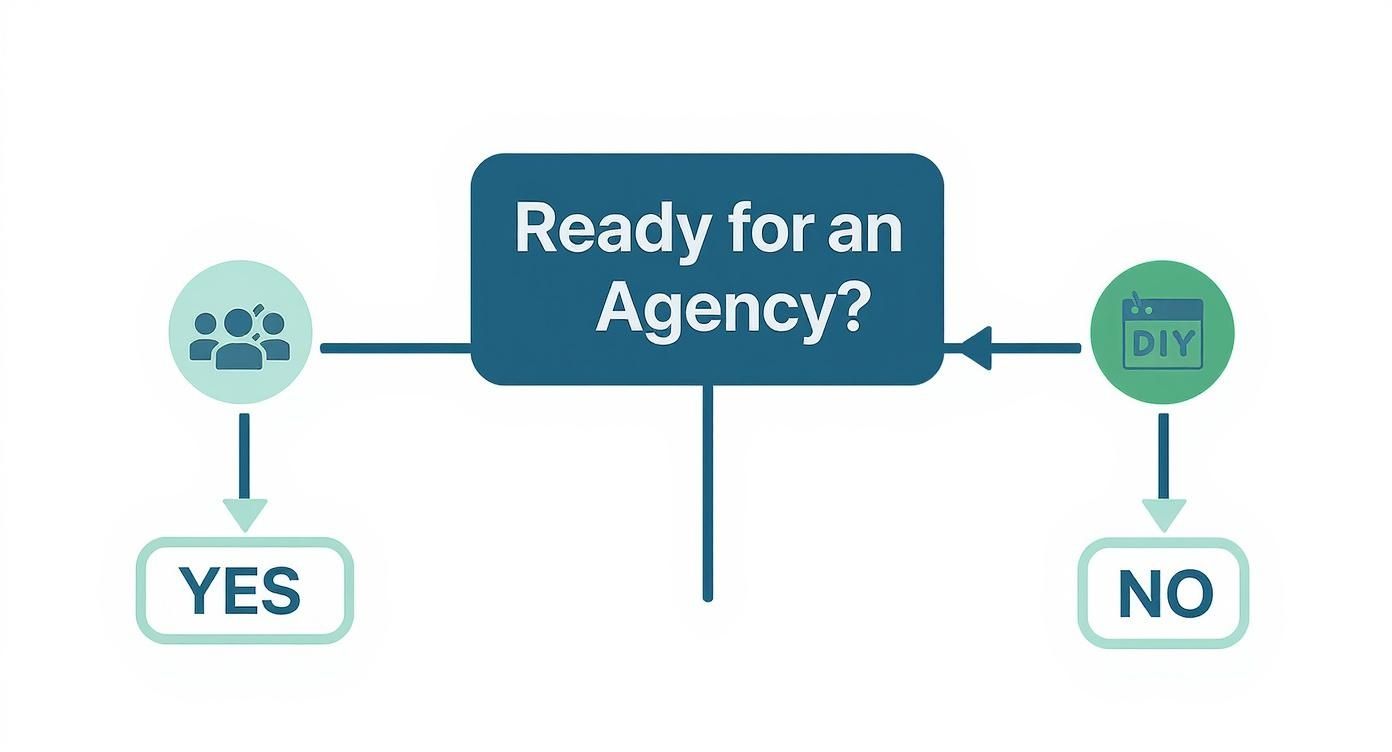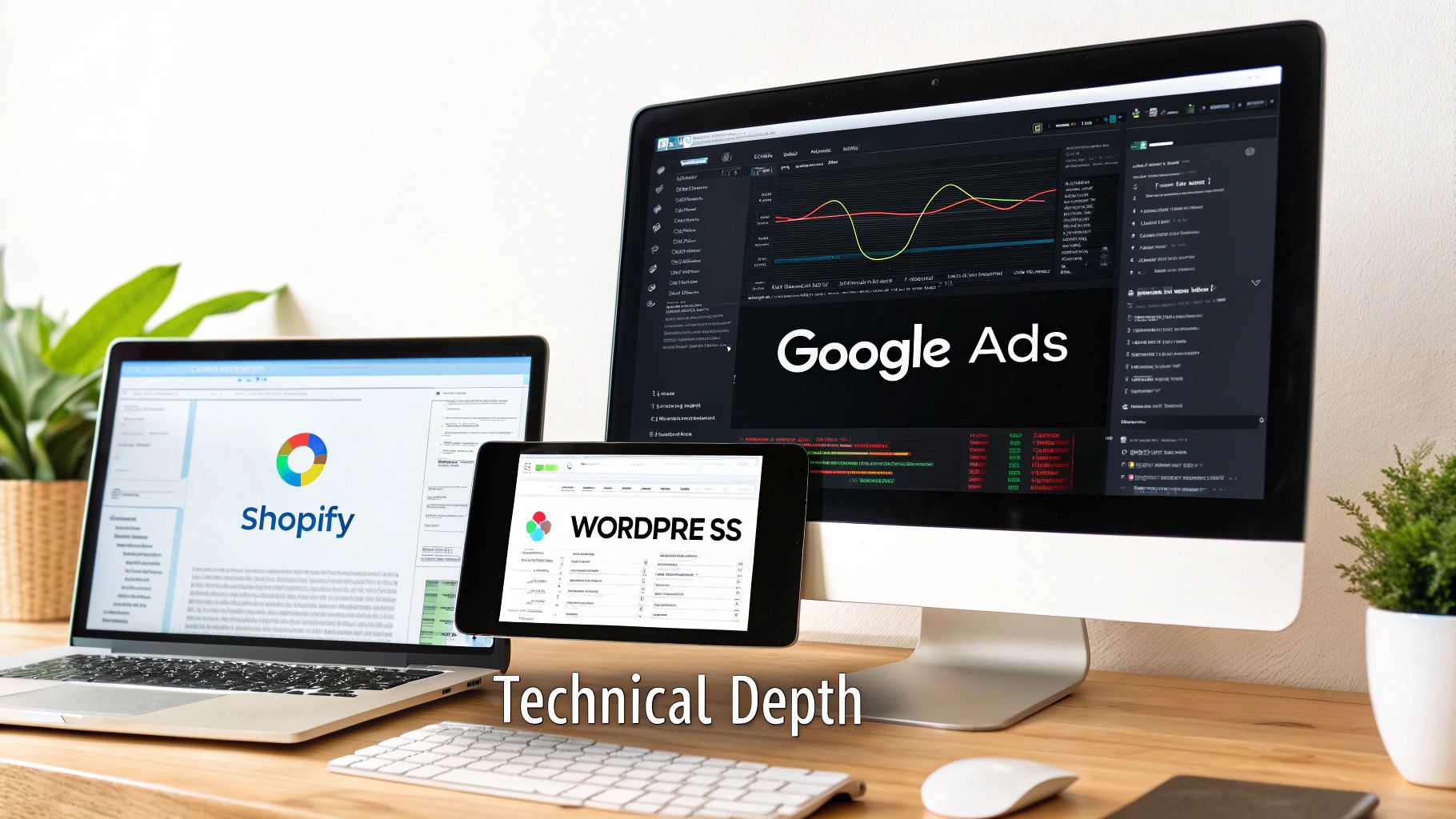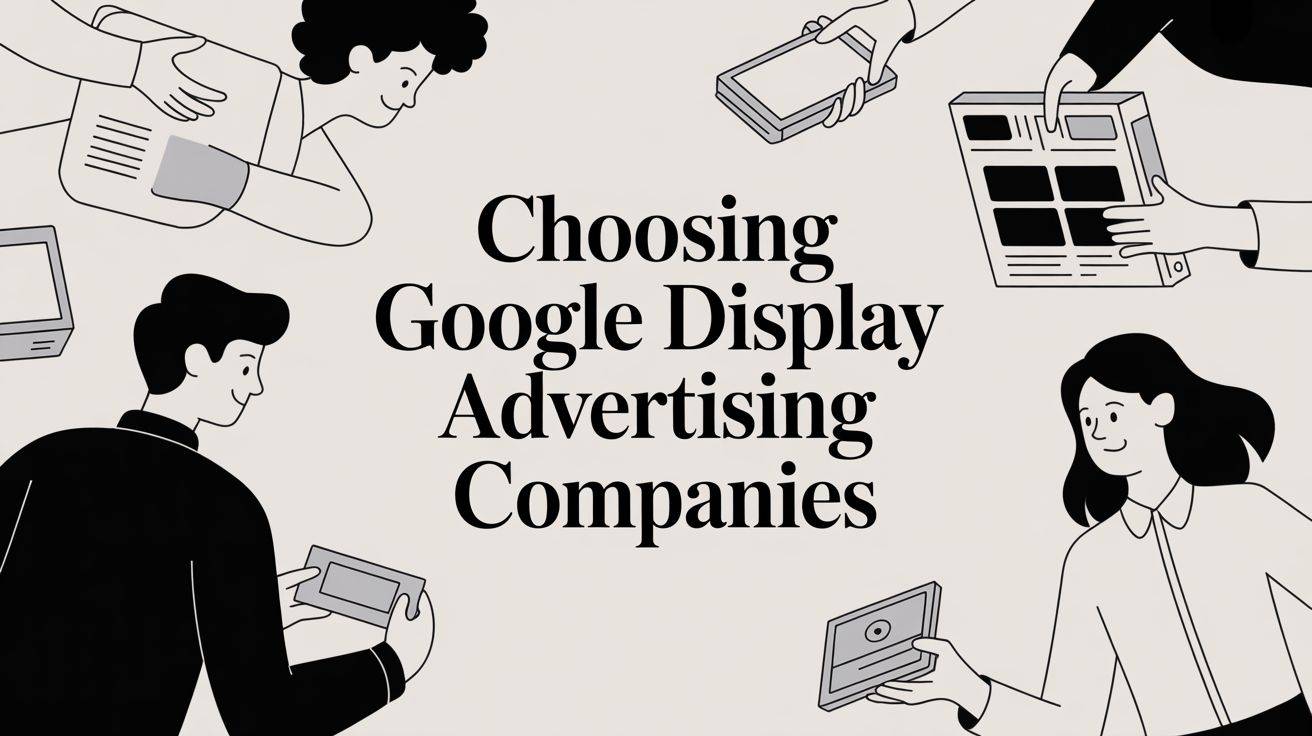So, what exactly is a Google Display advertising company? From my experience, they’re specialist agencies that live and breathe visual ad campaigns across Google’s huge network of websites, apps, and videos. Unlike a generalist firm, these partners are laser-focused on the creative, the targeting, and the nitty-gritty optimisation needed to make display ads drive real business outcomes—not just empty clicks.
Why the Right Display Partner Is a Game Changer
I've seen firsthand how a great Google Display advertising partner can completely transform a business. I’ve also witnessed the damage a bad one can do. It’s not just about turning on ads; it’s about finding a team that genuinely gets your business goals and the entire digital ecosystem you operate in.
In my experience, the difference always comes down to strategy.
A top-tier agency doesn't just ask for your budget and disappear. They dive deep. They want to understand your customer journey, your Shopify or WordPress setup, and how display ads will work alongside your other marketing efforts, like your Facebook Ads. I've worked with agencies that can do everything from WordPress development and WordPress design to complex Shopify development and Shopify design, and that integrated knowledge is invaluable.
A generic "Google Ads" agency might be a gun at search campaigns, but display is a different beast altogether. It needs a unique blend of creativity, technical skill, and strategic foresight. For example, they’ll know instinctively how to structure campaigns differently for a service-based business using Google ads for contact form submissions versus an e-commerce store hunting down sales.
The Value of Specialised Expertise
A true display specialist understands the nuances that actually drive performance. They can map out a clear Meta ads creative testing process and then explain how those learnings will inform your display creative.
They’re also technically sharp, capable of setting up Google Tag Manager containers and implementing the Meta Conversion API to make sure every single dollar is tracked accurately. I've seen the chaos that ensues when this is done wrong, and it costs businesses a fortune.
This level of expertise is critical. With so much on the line, you really can't afford a partner who's just learning the ropes. You need someone who can also advise on your overall paid media strategy, including the pros and cons of PMAX vs Google Shopping ads.
The best Google display advertising companies act as a genuine extension of your team. They bring a deep, specialised skill set that connects creative strategy on the front end with complex technical setups on the back end, like configuring the Shopify API or building custom blocks in Gutenberg for landing pages.
To really get why a skilled partner makes such an impact, it helps to have a foundational grasp of the platforms they manage. This guide to getting started with Google Ads is a great starting point. This knowledge helps you appreciate why a specialist team—one that uses creative and targeting in sophisticated ways—is what drives real growth, not just vanity metrics.
Your Essential Agency Vetting Checklist
Before you even think about signing on the dotted line with any Google Display advertising company, you need a solid vetting process. Trust me, I’ve learned this the hard way over the years. I’ve since developed a checklist that has saved me countless headaches, and it goes far beyond just spotting a Google Partner badge. That's just table stakes.
The real test starts when you dig into their case studies. Are they just showing off vanity metrics like impressions and clicks? Big deal. I want to see real business outcomes, like a tangible lift in return on ad spend (ROAS) or a measurable increase in qualified leads. I always ask to see examples of their creative work, too; it’s a quick way to tell if they actually understand visual storytelling for display ads.
This decision tree gives you a simple starting point to figure out if an agency is the right move for you right now.

As you can see, the choice isn't just about budget. It's about having the time, the in-house expertise, and the strategic goals that justify bringing in a specialised partner.
To help you get started, here's a quick-reference checklist I use to compare agencies on their core skills. It helps cut through the sales pitch and focus on what really matters.
Agency Vetting Checklist: Core Competencies
| Competency Area | What to Look For | Red Flag |
|---|---|---|
| Proven Experience | Detailed case studies with ROI and ROAS metrics. Examples of work in your industry or a similar one. | Vague results, focusing only on clicks and impressions. No relevant industry experience. |
| Technical Proficiency | Fluent in Google Tag Manager, Analytics, and conversion APIs. Can explain their tracking setup process clearly. | Stumbles when asked about technical details. Unfamiliar with server-side tracking or APIs. |
| Creative Capabilities | A strong portfolio of display ad creative. Can articulate their creative testing methodology. In-house design and UX skills. | Generic or uninspired ad examples. No clear process for testing or optimisation. |
| Strategic Approach | Asks insightful questions about your business goals. Discusses audience targeting and campaign structure logically. | Jumps straight to tactics without understanding your strategy. Uses a one-size-fits-all approach. |
| Communication & Reporting | Provides clear, customised reports that tie back to business goals. Proactive communication style. | Confusing reports filled with jargon. Poor responsiveness or unclear points of contact. |
This table is just the beginning. The real insights come from the conversations you have, where you can probe deeper into their actual skills and strategic thinking.
Probing Their Technical Skills
More importantly, you need to find out if they’re technically sound. A top-tier agency is fluent in the entire analytics stack, not just the ad platform itself. They shouldn't look like a deer in the headlights when you ask about the more technical side of modern performance marketing.
Here are the core technical areas I always dig into on discovery calls:
- Google Tag Manager and Analytics: Can they confidently walk you through their process for setting up Google Tag Manager containers and configuring GTM and Google Analytics goals? Their answer shows you whether they build campaigns on a solid foundation of data or just guess.
- Conversion Tracking: What’s their experience with the Conversions API installation for Meta? This is non-negotiable for anyone running ads on Facebook or Instagram alongside Google, as it ensures accurate tracking.
- Platform-Specific Development: This is where you separate the experts from the amateurs. For an e-commerce brand, have they ever worked with the Shopify API or gone through a Shopify development crash course? Even better, have they experience building custom Shopify apps using Shopify CLI? For a content-heavy site, can they talk about building custom blocks in Gutenberg for WordPress? This shows a level of technical depth that most agencies just don't have.
Evaluating Their Strategic Approach
Beyond the technical setup, I want to understand how they think. I’m not just hiring someone to push buttons; I'm hiring a strategic partner who can help grow the business.
That’s why I ask specific, scenario-based questions about campaign management to see how they approach real-world challenges.
A truly great agency will be able to explain their Meta ads creative testing process in detail. They should have a structured, data-driven methodology for finding winning ad creative, not just a "let's throw it at the wall and see what sticks" approach.
I also want to get their take on campaign structures. For instance, what's their view on PMAX vs Google Shopping ads for an e-commerce client? How do they manage campaign priority in Google Ads to control budget allocation effectively? For service-based businesses, I’ll ask how they optimise for contact form submissions beyond just tracking the final thank-you page. This is critical for getting good results with Google ads for service based businesses.
Their answers to these detailed, experience-based questions will tell you everything you need to know about their capabilities long before you ever sign a contract.
Key Questions to Ask Before You Hire Anyone
When you’re on those initial calls with potential agencies, you need the right questions ready to go. This is how you separate the real experts from the smooth talkers. Over the years, I've learned to ditch the generic stuff and ask questions that force them to reveal their hands-on expertise.
I’ll share my go-to list that cuts right through the sales pitch.
I always start with their process. No fluff, just a direct question like, “Walk me through your creative testing process for Meta and Display ads.” Their answer tells me everything I need to know. Do they have a structured, data-driven approach, or are they just guessing and hoping for the best? A strong answer will mention methodical testing of headlines, images, audiences, and creative formats.
Probing E-commerce and Lead Generation Expertise
Next, I get into the platform-specific nitty-gritty. A killer question for any e-commerce brand is, “What’s your experience with Performance Max vs. standard Shopping campaigns, and when would you recommend one over the other?”
This single question reveals their grasp of modern campaign types and their strategic thinking around Google's automation. A good agency will be able to explain when PMax is the right tool for scaling and when a standard Shopping setup provides more granular control that a business might need. This is particularly relevant if you're running Google Shopping ads for dropshipping, where margins are tight.
For service-based businesses, my focus shifts to lead quality. I'll ask something like, “How do you optimise for contact form submissions beyond just tracking the final conversion?”
I’m listening for answers that go deeper than just "we track form fills." I want to hear about setting up micro-conversions, landing page optimisation, and strategies they use to improve the quality of leads, not just the volume.
A great agency won't just say they 'optimise for leads'. They'll explain how they use audience signals, layered targeting, and negative keywords to filter out the tyre-kickers and attract high-intent prospects who are ready to buy.
Assessing Technical Chops
Finally, I always test their technical skills. This is completely non-negotiable.
I’ll ask, “Describe your process for setting up Google Tag Manager containers and the Meta conversion API for a new Shopify store.” A confident, detailed response here is a massive green flag. They should be able to talk about triggers, tags, variables, and the importance of server-side tracking without skipping a beat.
In Australia, a realistic budget and sharp execution are everything. While the average cost-per-click for Display ads sits at a budget-friendly AUD $1 to $2, a shocking number of new advertisers burn through their cash within three months because of poor management.
Around 68% of small businesses see a positive return, but usually only after six months of consistent, intelligent effort. An agency's technical and strategic depth is what lands you in that successful group. You can find out more about the costs and returns of Google Ads for Australian businesses.
These questions are designed to be tough for agencies that lack real, in-the-trenches experience. Their answers—or their hesitation—will tell you everything you need to know about who you can trust with your ad budget.
Gauging an Agency's Strategy and Technical Depth

A great display campaign isn’t just about pretty pictures. I’ve seen firsthand that the best campaigns are built on a rock-solid technical and strategic foundation, and this is where many agencies fall short. You need a partner who gets the whole picture, from the creative that grabs a user's attention right through to the back-end data that makes it all work.
This is where I start digging for genuine technical depth. Do they talk about building high-converting landing pages using custom Gutenberg blocks on WordPress, or is their plan just to dump traffic on your homepage? That distinction alone can be the difference between a campaign that flops and one that flies.
And if you’re running a Shopify store, the questions get even more specific. Have they ever actually worked with the Shopify API or done Shopify development like building custom Shopify apps using Shopify CLI? This kind of hands-on development experience tells you you're talking to an elite team, not just someone who knows their way around the Google Ads dashboard.
More Than Just Managing Ads
A top-tier agency’s expertise goes way beyond the Google Ads interface. Their strategy should be woven directly into your tech stack. It's not enough for them to just run the ads; they need to understand the detailed Google Display Advertising specs, including every required ad dimension and format.
This technical knowledge directly fuels their strategy. I always press them on the specifics:
- Audience Targeting: How, exactly, will they use first-party data, custom intent audiences, and in-market segments to find your ideal customers? Generic answers won't cut it.
- Remarketing Strategy: Ask for real examples of how they’d segment your website visitors for remarketing. If their best idea is a generic "all visitors" list, that’s a massive red flag.
- Campaign Structure: Their proposed campaign structure needs to align perfectly with your business goals, whether that’s getting more contact form submissions or driving direct sales through an Instagram shop and Facebook shop.
The best agencies don't just throw around buzzwords like AI and machine learning. They can explain exactly how Google's AI optimises bids and creative delivery in real-time to squeeze maximum value from every dollar of your ad spend.
This combination of strategic and technical rigour is non-negotiable. With AI-driven tools like Performance Max now at the centre of the ecosystem, a technically sharp agency is your best bet for navigating this space and getting a return that actually moves the needle for your business.
Decoding Contracts, Pricing and Reporting

This is where the rubber meets the road. An agency's contract and pricing model can tell you everything about their confidence and transparency. I've seen it all over the years, and I can tell you the structure of your agreement is just as important as the campaign strategy itself.
Let's break down the common pricing models you'll run into, so you know exactly what you’re signing up for.
Common Agency Pricing Models
The way an agency charges reveals their incentives. It's crucial to find a model that aligns their success with your business growth, not just with how much you spend.
- Percentage of Ad Spend: This is the classic model where the agency takes a cut (usually 10-20%) of your monthly ad budget. It’s simple, but it can subtly incentivise them to increase your spend, even if it’s not the most efficient way to get results.
- Flat Retainer: You pay a fixed fee each month for management. I personally prefer this model for its predictability. It allows the agency to focus purely on performance and strategy without being influenced by fluctuations in your ad budget.
- Performance-Based Fees: This model ties the agency's fee directly to specific results, like cost per lead or ROAS. While it sounds great in theory, be cautious. The KPIs must be crystal clear to avoid disagreements down the line.
- Hybrid Model: Often the best of both worlds, this combines a lower flat retainer with a performance-based bonus. It gives the agency stability while rewarding them for hitting ambitious goals.
Beyond the Standard Google Ads Report
A great partner will never just email you a standard PDF export from the Google Ads dashboard and call it a day. That tells you almost nothing about what’s actually driving your business forward. For me, a generic report is a massive red flag.
Your agency's reporting should be a customised dashboard that connects ad metrics like CTR and CPC to your actual business KPIs. I'm talking about metrics that matter to your bottom line, like customer lifetime value (CLV) and true cost of acquisition (CPA).
A top-tier partner will integrate data from Google Analytics, your CRM, and your e-commerce platform (like Shopify or WordPress) to give you the complete picture. They should be able to show you exactly how display campaigns are contributing to revenue and lead quality, not just clicks.
Key Contract Clauses to Watch For
Finally, before you sign anything, comb through the contract for a few critical clauses. Getting locked into a bad relationship because of a tricky contract is a painful—and expensive—lesson to learn.
- Account Ownership: You absolutely must have full ownership and administrative access to your Google Ads account. Never, ever let an agency create the account under their own name. If you part ways, you could lose all your valuable campaign data and history.
- Notice Period: What are the terms for ending the contract? A 30-day notice period is standard and fair. Anything longer should be questioned, as it might suggest the agency lacks confidence in retaining clients through performance alone.
- Scope of Work: The contract must clearly define all deliverables. This includes the number of campaigns they'll manage, the frequency of reporting, and who owns the creative assets. This clarity prevents misunderstandings and ensures you get what you're paying for.
Answering Your Top Questions About Choosing a Display Agency
When you're looking to hire a Google Display agency, a few questions pop up time and time again. It’s a big decision, and it's totally normal to want clarity before you commit. I’ve been on both sides of these conversations, so let me break down the most common queries I hear.
How Much Should I Actually Spend on Google Ads?
This is the big one, and the honest answer is: it depends. I’ve seen tiny campaigns succeed with just a couple of thousand dollars a month and then scale into monsters. So, what budget to spend on Google ads? It’s not about a minimum spend; it’s about having enough budget to gather meaningful data.
If you don't have enough data, you're just guessing.
As a rule of thumb, I always recommend a starting budget that can generate at least 10-15 conversions a month. This gives an agency enough feedback to see what's working and what isn't. So, if you're wondering how much does it cost to start Google ads, and your average cost-per-acquisition (CPA) is around $50, you’d want to start with at least $500-$750 in ad spend, plus the agency's fee on top.
What's the Real Difference Between a Specialist and a Generalist Agency?
Think of it this way: a generalist agency is like a GP. They can handle your Facebook ads, manage some SEO, and run your Google ads. A specialist Google Display advertising company, on the other hand, is like a surgeon. They live and breathe the tiny details of visual advertising on Google’s network.
From my experience, the difference is night and day. A specialist brings a level of depth that a generalist just can’t match. They’ll have a deep understanding of:
- Creative Strategy: They won't just slap an image in an ad. They’ll have a structured Meta ads creative testing process that informs their display creative, knowing that what works on one platform needs adapting for another.
- The Technical Muck: They’re fluent in setting up Google Tag Manager containers, implementing the Meta Conversions API, and can troubleshoot tricky tracking issues on platforms like Shopify or WordPress without breaking a sweat.
- Advanced Tactics: They can have a proper debate about the pros and cons of PMAX vs Google Shopping ads for a dropshipping store, or explain exactly how to configure campaign priority in Google Ads to wrestle back control from the algorithm. A beginners guide to google shopping ads from them would be full of real-world insights.
A generalist knows the basics. A specialist knows how to squeeze every last drop of performance out of your budget.
My Google Shopping Ads Aren't Spending. Can an Agency Fix This?
Absolutely. This is a classic problem and a perfect test for a good agency. When I see Google Shopping ads not spending budget, my mind immediately runs through a checklist of culprits: low bids, a disapproved product feed in Merchant Centre, targeting that's way too narrow, or just a messy campaign structure.
A skilled agency won't guess. They'll dive straight into your Merchant Centre, comb through your product data, analyse your bidding strategy, and audit the campaign setup. This is where a specialist’s hands-on experience pays for itself.
I always say that hiring an agency isn't just about outsourcing tasks; it's about buying experience. You're paying them to solve problems faster than you could on your own because they've seen and fixed them a hundred times before.
Do I Really Need to Sign a Long-Term Contract?
Nope, and you shouldn't have to. I get really wary of agencies that demand a 12-month lock-in right from the start. A confident agency knows its worth and will be happy with a 30-day notice period or a three-month initial commitment at most.
Their performance should be what keeps you as a client, not a restrictive contract. Look for a partner who is upfront about their terms and wants to build a relationship based on results. This way, their incentives are always aligned with yours: driving real, measurable growth for your business.
At Alpha Omega Digital, we build high-converting websites and accelerate your growth with performance-focused Google Ads and paid social campaigns. We believe in transparent partnerships that deliver measurable results, not long-term lock-ins. To see how we can build a lead generation engine for your business, visit us at https://alphaomegadigital.com.au/.
Article created using Outrank


